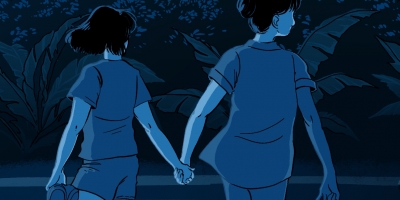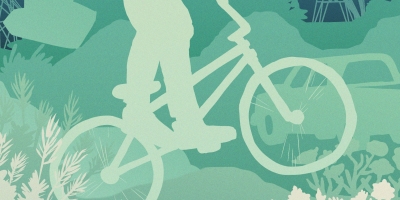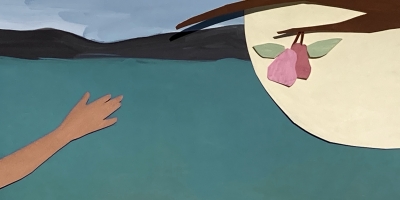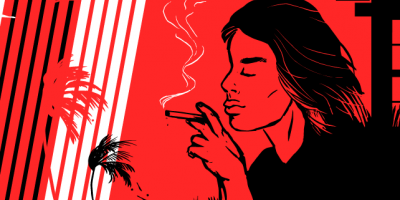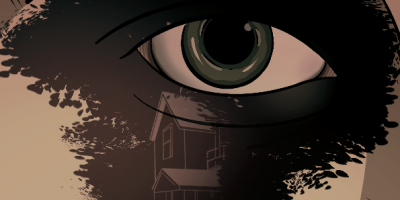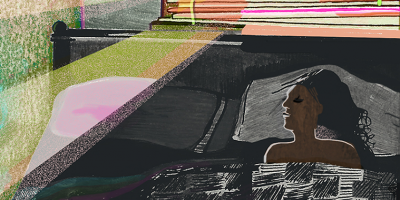Fiction
Skins
by K-Ming Chang
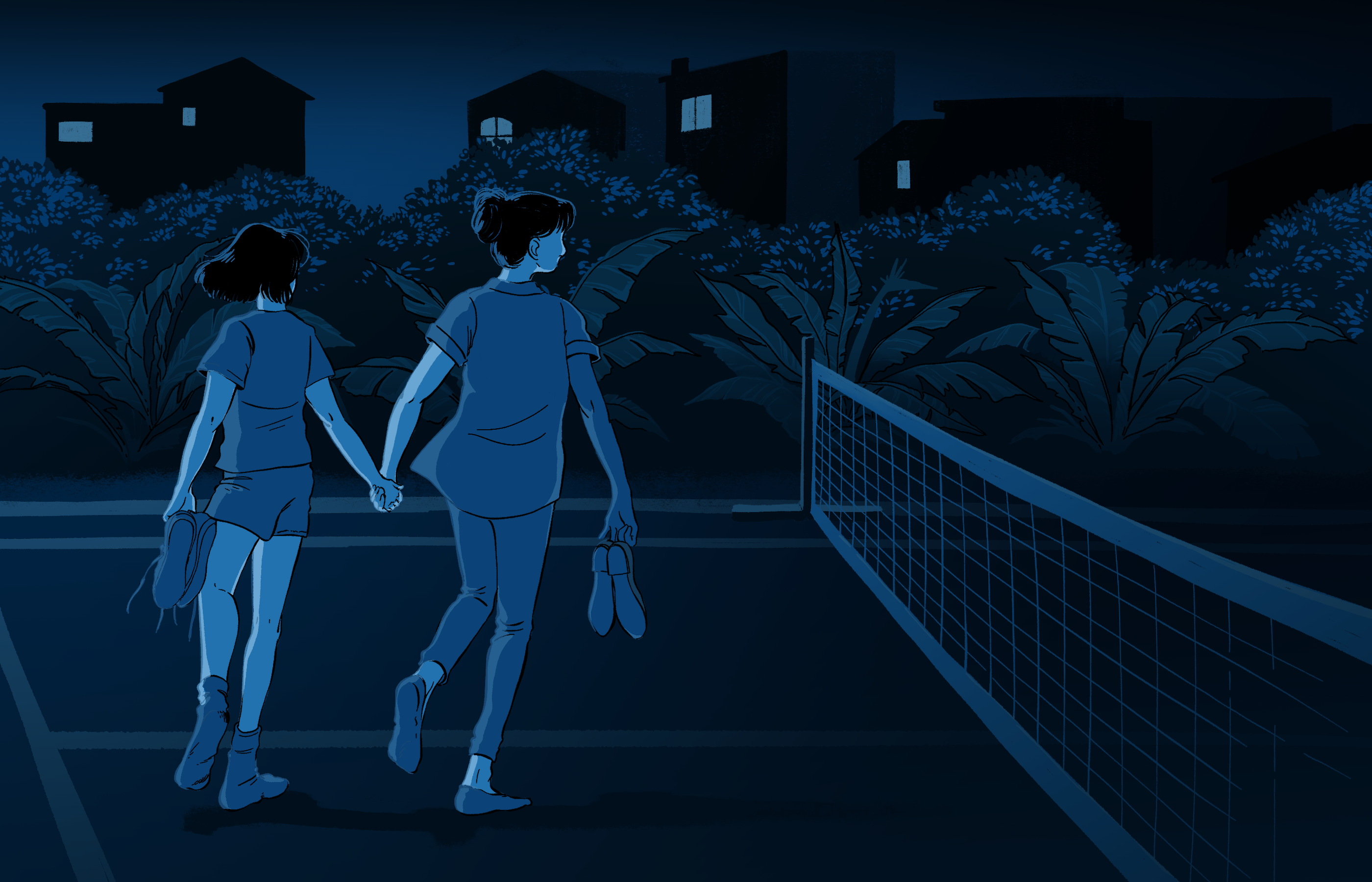
We were shoplifted out of our mothers, Mace and me. My mother was eight and a half months pregnant when she fell asleep on the bus and woke up at the end of the line with her belly like a slashed tire, sputtering hot air, salt water bolting out of her. She took the bus in the opposite direction, back to Milpitas, as if that would reverse the whole day, her belly inflating with rain, fetus-me screwed back inside her like a light bulb. For months she rode the bus, every line ending in every city, checking every seat and slimed floor, looking for an unborn baby—but her sister told her that there was no way the baby had just been misplaced, because wasn’t there an umbilical cord exactly for this purpose? So that the child was bound to a radius and could be yanked back between the legs? But there was no cord for my mother to tug, except the yellow one on the bus that alerted the driver to stop, and my mother gave up. Two years later, when she was working at a guasha parlor and slept with a jade leaf on her tongue every night, she woke up one morning refilled with me, giving birth later that day. Her sister told her that some deity must have wanted to borrow my unborn body for something, but had returned me when they were done, resulting in a briefly disappeared pregnancy, and because of this miraculous return, I should be named a saint. My mother compromised and named me Sacred, and though she never said so, not even years after scraping my back into a dolphin’s, raking me with her curved jade, nicknaming me her best customer—my skin ballooning off my bones—I knew that a part of her wished I had never been given back. She’d long ago assimilated to my absence, and her life unlatched from mine even before I was born: as a baby, it was my aunt who allowed me to cuff my mouth to her nipple, who stirred windowsill dust into water and called that milk.
At the guasha parlor, it was my job to clean the jade scrapers by plunging them in oil and laying them out on a towel beneath a lamp that forfeited its light every six weeks and that my mother kept telling me to replace. Not another one from Taobao, she said. Chinese people can’t make shit.
I asked her if she was including herself in that statement.
Yes, she said, how else could I have made a daughter as stupid as you. But she laughed as she said it, combing my forehead with a tooth of jade, loosening shingles of hardened sweat.
The parlor’s windows were blacked out, and sometimes little kids pressed their faces to the glass, trying to see inside, and my mother always responded by throwing something at the window so that the glass flinched like skin and the kids fled crying. I counted guava candies into a glass dish, rolled one in my mouth, threading my tongue through the sweet bead of it. Most of our customers were mothers or men: the mothers wanted us to remove their stretch marks and vaginal varicose veins, and the men wanted us to mother them. I watched my mother rake the jade across their oiled backs, their shoulders brittle as wishbones beneath her hands, their skin rasping into flakes, collecting on the ground so that I’d sweep up the shedding after, oily wafers of skin and dirt I’d file away on my tongue and dissolve into salt-dew.
Mace was stolen more literally: after her mother gave birth to her in the back unit of a duplex in San Jose, her father came in through a hole in the roof and rappelled into the bedroom, strapping her to his belly and lassoing a plane to lift him out. I called bullshit on this story many times, and later learned that her father did one day hit her in the head with a bike lock and shuffle her body into his backseat, driving her up to his house in Livermore, where he attempted to assert custody by installing a flat-screen TV on the wall and wedging the remote in her mouth like a dog bone and saying, See, stay. Her mother then reasserted custody by taking the bus up, half-strangling her father with a hose, and bringing Mace all the way back down, where they both still live in the back unit of the duplex where Mace was born, and where she studies for her real estate license. You don’t need to have a high school diploma to be a real estate agent, did you know that, she said to me. You only have to be eighteen, which I already did a few years ago.
The first time I met Mace, she came in to my mother’s guasha parlor with skin like sawdust, sprinkling our feet, salting our tongues. My mother and I coughed, spitting bits of her dead skin, and swung open the doors to prevent our lungs from becoming granite dust. It hurt to inhale around her, and her dead skin cluttered the air like a constant mist, flecking the windows and chipping the black tint, letting shreds of light inside. After Mace, the blacked-out windows reminded me of cartoon skies, stars of all sizes chiseled into the paint like acne scars.
Mace didn’t seem to notice that she was blocking all our airways. I watched my mother put on gloves and lift her jade scraper, a canine of light. A part of me wondered whether Mace had skin beneath the shedding, if my mother would try to cup her back and the glass would puncture through her like a cloud. But I could see through the haze that she had a face, eyes that looked like they were only safety-pinned, a high nose like a soap opera empress. A cleft in her bottom lip that was a rut of dried blood. I licked my own lip, expecting to taste the salt mirrored on mine, but of course we had different mouths, hers smiling now, saying not to worry, we wouldn’t have to touch her directly, she wouldn’t be offended. My mother, who had touched every species of scar, and who prided herself on opening pores like windows, said, I’ll recirculate you. I’ll reroute all your blood someplace safe.
She led Mace into the back room, where I didn’t go except to boil the water and refill my mother’s tea jars and dress the tables in oiled paper. I heard my mother coughing and Mace’s voice, which was in contrast with her dusted appearance, so clear that it was almost painful to hear directly. She had the kind of voice, I realized, that would sound beautifully burred over the phone, grained and gold, fraying at the edges of her sentences, knitting over your name. I wanted to hear her say my name once, Sacred: I wanted her to pray it.
At the end of the hour, my mother emerged with her mask on, though she always complained that the mask became a hammock of spit and sweat, and Mace was filtered of dust. I was disappointed to see the solidness of her skin beneath the smog of shed cells: she’d reminded me of those illustrated planets you learned about in elementary school, how their surfaces were made of gas, their continents made of movement, their skies made of steam. Now she was grounded, a girl with diagonally-sliced bangs and two moles on the left side of her face that were perfectly aligned, like another set of eyes, and for a second I wondered if she was watching me through them, her head tilting when she spoke to me. I watched the back of her neck as she paid in all cash—which my mother would later store in a cookie tin hidden inside a sofa cushion—and saw that in this light, faint collars of dust were visible, glittering rings she wore without knowing. I was relieved that her skin hadn’t completely stilled, that she hadn’t yet decided on a gravitational pull to follow.
Even after the guasha session, there was something unsettled about her, as if there were other limbs she was hiding beneath her yellow T-shirt, and when she left—my mother would later say she tipped like a white person: enough—I opened the door for her without realizing it, as if I were personally escorting her out. She smiled at me, her canines crooked and tilted in, and I asked for her name. I was hoping this would induce her into asking mine, but instead she said Mace and left. Mace, I said, repeating it to myself, thinking it was short for something like Maisy, the kind of old white-woman name that all my cousins coveted. But the second time we met, she clarified: Mace, as in the stuff you spray on men. My mother is a very paranoid person.
I laughed. It was about a month later when I’d finished closing up the parlor and saw Mace at the bus station directly across from mine, going the opposite direction, north instead of south, and I decided to pretend I was going the same way. For a long time that was what I thought love was, to be parallel to someone, even if you never once touched. I told myself I didn’t have to talk to her or approach her: I only had to retrace the lines she lived for herself, staple my shadow to the same places on the street, and that was the same as knowing her. But it was Mace who saw me standing behind the bus stop, pretending to be reading an advertisement for tattoo removal. There were only three things that were advertised in our part of San Jose, my mother liked to say: tattoo removal, bail bonds, and GOLD 4 CASH. I looked at the blurred and blown-up photograph of a man’s hair-flecked bicep, the name that wrapped around it: MELISSA FOREVER. The advertisement had illustrated an X through the name Melissa, along with the caption: When love doesn’t last forever, your tattoo shouldn’t have to.
I don’t get why you have to remove it just because it isn’t true anymore, Mace said. She’d walked around to me, looking up at the neon advertisement, laced with its light.
Because it reminds you of something you don’t have anymore, I said, without looking at her face. I memorized the listed phone number on the ad while she spoke to me, as if it would later be useful, though I had no tattoos and knew no names beside my own. The last digit was spray-painted with someone’s initials, and I wondered how long it would last, though it never rained long enough here to erase anything.
That’s not that bad, Mace said. I’d rather be reminded of something I’ve lost than be totally blank. I flinched, thinking she was saying something about me, but she smiled and said, Your mother is miraculous! She tornadoed my skin dust away! She dynamited my back! Now I kinda look like I have mold growing all over me, but beautifully!
She turned around and lifted up the hem of her gray shirt, showed me her shadowed back, the pores dilated wide as windows. I saw skies in her skin. Turning away, I said: Be careful about exposing your back that way. The toxins of the world can get in, I said, quoting my mother. Mace laughed and told me about her name, saying that caution was her inheritance, that she was born a weapon of defense.
The bus came as she was telling me a story about her cousin who studied acupuncture and tried to re-pin her skin to her bones, but even then, the dust didn’t clear. Your mother did it like it was nothing, Mace said. She touched me like a saw touches a beam of wood. She made me a shape.
Mace spun slow, modeling her sanded skin, and then the bus came and gowned her in exhaust. There were no seats left, so we stood chest-to-chest, wrists braceleted by the yellow straps. I wanted to look away, but Mace was smiling again, asking why I had followed her.
I turned my head away, trying to look out the window, but night pressed its palm against the glass and all I could see was my own face, small as a nickel, dull next to hers. Where do you live, I asked, because I didn’t know how to answer. I wanted to rake my knuckles against her arm, stirring up the silt of her dead skin, hogging the air between us.
Mace explained that she was working as an assistant to an assistant real estate agent—she was studying for the exam, which she’d already failed twice—and there was a house in Saratoga that needed its flyers refilled. She unzipped her black backpack and showed me the glassed sheets of paper, rolled up into batons. Five bedrooms, five baths, plus a pool, and a pool house with another bathroom. She told me that she used to think a pool house was a house inside a pool, underwater and glossed like a mushroom, and she was disappointed to learn that it was only a smaller house, severed from anything.
The bus entered the hills where rich people lived, where the trees grew thick as hairballs and the houses were far apart. Mace pointed at each and told me the style of architecture, fake Tudor, fake Victorian, though I didn’t know how she could tell: blurred against the windows of the bus, each house looked like a milk spill.
At home, one of our duplex neighbors was Mr. Huei, an unlicensed contractor who got paid in cash-bricks. He used to describe houses like these to my mother, how one couple asked him to tile the bathroom with hexagons so that it resembled the inside of a beehive, and after hearing this story, I dreamed for weeks of licking our popcorn ceiling, hounding the walls for honey. The defining feature of my early childhood, I told Mace, was sugar. Corn syrup on crackers when the bills weren’t paid, white bread and pork floss at school, guava candies my mother bought for the reception desk of the parlor. Mace said that the defining feature of her childhood was one-handed. Back in Liaoning where she was born, she told me, she was training to be a child acrobat. She’d even gotten into the Guinness Book of World Records for balancing in a one-handed handstand for the longest consecutive period of time. There are pictures, she said. I’ll show you sometime.
I tried to imagine her upside-down, propped on one palm, back arched, the hours of hovering like that, suspended above me, and I knew that I was right, that I would only ever orbit her.
The bus whittled its path up the hills, and then it was the last stop, and Mace was getting off, her backpack hugged to her front. I followed her off the bus, walking slightly behind her, shouldering her shadow. Fake Greek, Mace said, pointing to the right: look at those plaster columns, the gate, the olive trees. I squinted at the trees and asked her how she could even tell what grew there in the dark. Mace told me she had a gift, that just by looking at something she could wrap her mouth around its meat, tongue its bitter seed.
We walked uphill along the sidewalk, Mace dangling her backpack from her right shoulder now. We established that we were both twenty-two, living with our mothers, and had been home births. People think that doesn’t make a difference, Mace said, but people born at home are different. It’s because it’s a non-sterile environment. You absorb a lot of things too early. What kinds of things, I asked Mace, but she didn’t tell me. We’re here, she said, and I cringed at the echo of her voice, the way it roped around the iron curlicue gates and tugged on the bars. Don’t worry, no one will hear us, she said, and it was true that the houses were all gated, with driveways that slithered so far away that I couldn’t see the faces of the houses, only the light in the windows, thick as pus.
This one is empty anyway, Mace said, unrolling the flyers and shelving them into the plastic cubby on the For Sale sign. On the sign was the photo of a smiling Asian man, his teeth white as whale fat, his blue tie too tight. That’s Henry Li, she said, as if I couldn’t read. He’s kind of a scammer, but he says he’s going to buy me a car when I pass my exam and then I won’t have to take the bus anymore. She smiled at me, and her face in the dark was far from me, the last of the light coffined in her mouth. But then if I get that car, you won’t be able to follow me anymore.
Mace laughed, and I just looked at her. I took a step uphill, avoiding the rim of grass where the sign was staked, wondering how people in the hills managed to own grass even in this drought, how was it possible to pay for all this green, to be indebted to the sky. Maybe all the rain was redirected here by some sort of cosmic sprinkler system. Then I was done thinking about cost, about consequence, and I reached her on the hill, leaning forward to kiss her. My hands on her shoulders, which were so much wider than mine, wired with warmth. Her hand on my cheek. I wondered if it was the same hand she used to balance on for hours, stacking her bones into a ladder. Her mouth cleaved open, and I sucked hard at the dried blood on her lower lip, thawing the blood on my tongue, reopening the slit until she stung. She kissed so meticulously, it was like her tongue was trying to alphabetize my teeth. I submitted to her order of things, let her hand wedge into my waistband, her fingers so cold I flinched and tugged at her ear, telling her, Not here.
Mace stepped away from me, sucking on her fingers, and I looked away, toward the street, my breath cut like a ribbon. Mace turned me back around and said, The house. Sweat mirrored her forehead, and I wanted to press my lips to it, steaming away the outline of my face. Someone’s dog was barking, and I thought for a second it was my own hunger articulating.
Mace gripped my wrist and walked down the sidewalk, her backpack still slumped against the staked sign. I know a way in, she said. I walked so close behind her that my nose nudged her shoulder, and she laughed. The night was spoiled with streetlight, but we were snug in our shadows. Mace whispered, Here, showing me a cleft between two broad-shouldered trees, where the white fence dipped and we could climb over it, landing in a tennis court.
Take off your shoes, Mace said, the paint on the court flakes off on hard soles, and Henry will yell at me if we scuff it.
I kicked off my sneakers, my mother’s old pair, and carried them in my hands. Mace and I ran in our sock feet across the court, the streetlight slathering us, and then we were in a shadow again, rinsing ourselves off in a different dark: the red-brick house was elevated above us, wide as a sky, and Mace held my hand as we climbed up the marble stairs to the side of the house. What type is this, I asked her, and she said, Colonial.
I know where the key is, she said, and walked into the shrubs along the side of the house. She discarded her socks, toeing around in the black soil until she yelped, catching the edge of something. Her wrists disappeared into the dark, and then her hands emerged with a combination box. It unclasped for her, and inside was the key, as disappointingly dull as the key to the back unit of my duplex, the same burnt brass.
The front door was framed in white columns that reminded me of whale bones, the ribs of a myth. Mace unlocked the door silently, wiping her bare feet against the rubber welcome mat, and then we were inside, my shoes still in my hands. I looked for a place by the door to put them down, but Mace shook her head at me and whispered, You don’t have to do that, the previous owners were white. There were stained-glass windows on either side of the door, the light blushing through. Mace’s face looked like a mosaic, all the pieces reassembled, foreign to me. She was smiling, her teeth steeped in the red of the window, and then she turned her back to me, gesturing at the shape of a staircase, a spine curved ahead of us. She took my hand again, and I gripped her wrist with my other hand, following her up. It was so dark that I kept shutting my eyes just to see if I really had them open, and Mace narrated the house for me, pausing on the staircase to say, To the right of us is a photograph the stagers still haven’t taken down, it’s of a mountain range, but I can’t tell which one, and does it matter anyway, since all mountain ranges look the same, and if you look ahead you can see a closet at the top of the staircase, it’s huge, you could turn it into a meat locker if you wanted to, swing a whole horse carcass from the ceiling, and this right here is called a landing, it’s like when you have a staircase so long you actually need to take a break from climbing them.
Then Mace paused and said, We’re here, turn to the right, her hands steering me through a doorway, herding me into a looser dark, telling me to step softly because the floors were just newly waxed and we were the first ones walking on it. Her breath was wet on the back of my neck, and I wanted to lean my head back, to feel her hips against my ass. But instead I walked forward until my knees bruised themselves on something, and Mace said, That’s the bed. We can’t turn the lights on, she told me, because they’ll see. I wondered if she meant the neighbors or Henry Li or someone else. I leaned back onto the bed, trying to see the ceiling, but it was too high above me. Mace kneeled between my thighs, and a flurry of white dust rose from her skin, lighting our bodies briefly before it settled on the bed, a powdered moon, and then her tongue was inside me, her chin opaling in the dark.
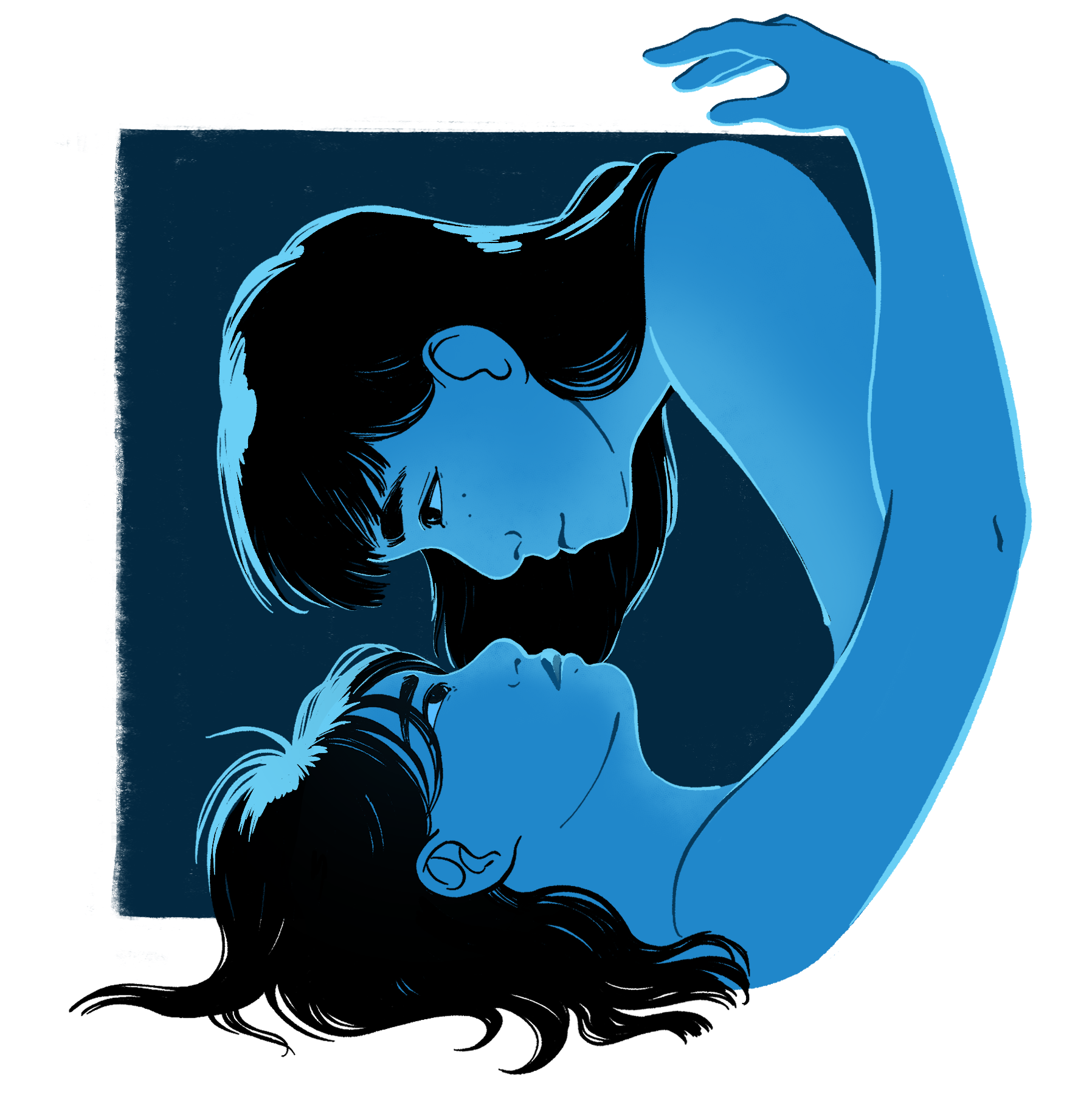
I fell asleep with my legs knotted around her, bruises annotating my collarbone, scraps of dried spit like tinsel in my hair. It was light when we woke up, and Mace and I stripped the bed together, still naked, the mattress gray-wet where my back pressed into it. I remembered rubbing her ear between my fingers the night before, feeling for the knot-scar of the place where she was pierced but wore nothing, then touching my own lobe, bare of my mother’s dowry earring, the matching absences we carried there.
Wearing only her T-shirt, Mace stood and nudged open the curtains a little, curating the light that was allowed to enter. From behind, sitting beside the mound of sweated-through bedding, I looked at the halves of her ass, the Mongolian mark she still had, blue and off-center, like mine before it faded away. I’d put my mouth there last night, licking it bright as a coin, running my tongue along the crack of her ass, listening to the sounds she made, so much more than my name. Sacred, she said, and it was the first time I heard her say it.
Look, she said, pointing through the crack in the curtains. She parsed through the anatomy of the yard, veranda, arbor, rose trellis, though they sounded to me like the names of skin diseases.
Aren’t arbors where boats go, I said, and she laughed, telling me that was a harbor. Harbors aren’t part of houses, she said, they’re where you go to find shelter in the water. I walked up behind her, propping my forehead between her shoulder blades, listening to the churn of her speech.
An arbor is like this wooden thing, like a skeleton, that plants grip to grow on, she said, Why don’t you look. She tilted her head to the side, and I looked down through the curtains, startled again by the sudden green, bright as beaded blood, and by the skeleton of bleached wood and the shadows it scribbled, the vines that cuffed its limbs, the white flowers that my mother would have cut the heads off, saying that it was bad luck to grow anything of that color.
Beside me, in the dim, Mace bit the ball of my shoulder, her teeth staking into my skin. I thought of all the times my mother cupped my back to open all the doors of my skin, saying it would release what had gone bad inside me. I told Mace a story about how my mother once built something like that on the roof of our duplex, a wooden frame that she used to grow grapes, but the landlord caught her up there and said it was dangerous, that she might fall off and get injured, and I knew he was afraid of paying for her life if she lost it on his property. Mace laughed, releasing my shoulder and widening the slit in the curtains. The light stretched itself sore, spraining like a tendon. I spit into my palm, rubbing my bitten shoulder with it, the way my mother said it was possible to erase pain. The grapes, I told Mace, were so sweet, so unconscious of their skins, full of seeds that shattered. I miss them, I said, as Mace got dressed. We left the dirty bedding on the floor like shed skin, like my mother’s bucket of callous scrapings that she rinsed out in the parlor sink, and Mace said it didn’t matter anyway, Henry was going to fire her soon, she’d found out from the other assistant, and she never needed a car anyway, she preferred to walk.
We walked down the hill along the sidewalk together, her shoulder nudging against my bruised one, and I smiled at the tang of pain, the secret soreness, my fingers sucked tender as skinless grapes. I’d tell my mother later that I’d been cupping my shoulder, that was why it was the color of wine, but I knew she wouldn’t believe me. By the time we reached the bottom of the hill, the sky had matured into a morning, too ripe for its night skin, sticky and lit. When the bus came and I boarded behind Mace, I looked out of the dusted windows, looking up toward the hills, though I couldn’t see anything but bed-headed trees. Mace saw me and said, We can’t see the house from down here. It’s means we’re too far below it now. I said, No, it means we’re getting close to home.
